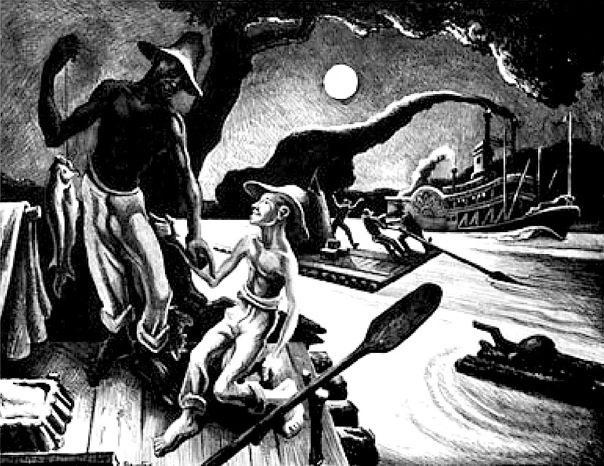
Is Huck Finn Racist?
Is Huckleberry Finn really a racist book?
Controversial in death as he was in life, Mark Twain has been seriously accused by some of being a "racist writer," whose writing is offensive to black readers, perpetuates cheap slave-era stereotypes, and deserves no place on today's bookshelves.
To those of us who have drunk gratefully of Twain's wisdom and humanity, such accusations are ludicrous. But for some people they clearly touch a raw nerve, and for that reason they deserve a serious answer. Let's look at the book that is most commonly singled out for this criticism, the novel that Ernest Hemingway identified as the source of all American literature: The Adventures of Huckleberry Finn.
For Twain's critics, the novel is racist on the face of it, and for the most obvious reason: many characters use the word "nigger" throughout. But since the action of the book takes place in the south twenty years before the Civil War, it would be amazing if they didn't use that word.
A closer reading also reveals Twain's serious satiric intent. In one scene, for instance, Aunt Sally learns of a steamboat explosion.
"Good gracious! anybody hurt?" she asks.
"No'm," comes the answer. "Killed a nigger."
But anyone who imagines that Mark Twain meant this literally is missing the point. Rather, Twain is using this casual dialogue ironically, as a way to underscore the chilling truth about the old South: it was a place where perfectly nice people didn't consider the death of a black person worth their notice -- where a "nigger" was, literally, not a human being. To drive the point home, Twain has the lady continue:
"Well, it's lucky, because sometimes people do get hurt."
That's a small case in point. But what is the book really about? It's about nothing less than freedom and the quest for freedom. It's about a slave who breaks the law and risks his life to win his freedom and be reunited with his family, and a white boy who becomes his friend and helps him escape.

Growing up among slaveholders, the boy naturally accepts the idea that slavery is part of the natural order. But as the story unfolds he gradually learns to see Jim as the man he really is. He’s forced to wrestle with his conscience, and when the crucial moment comes he decides he will be damned to the flames of hell rather than betray his black friend.
Meanwhile, Jim, as Twain presents him, is hardly a caricature. Rather, he is the moral center of the book, a man of courage and nobility, who risks his freedom -- risks his life -- for the sake of his friend Huck.
Note, too, that it is not just white critics who make this point. Booker T. Washington noted how Twain "succeeded in making his readers feel a genuine respect for 'Jim,'" and pointed out that Twain, in creating Jim's character, had "exhibited his sympathy and interest in the masses of the negro people."
The great black novelist Ralph Ellison, too, noted how Twain allows Jim's "dignity and human capacity" to emerge in the novel. “Huckleberry Finn knew, as did Mark Twain [Ellison wrote], that Jim was not only a slave but a human being [and] a symbol of humanity . . . and in freeing Jim, Huck makes a bid to free himself of the conventionalized evil taken for civilization by the town" -- in other words, of the abomination of slavery itself.
In fact, you can search through all of Twain's writings, not just the thirty-plus volumes of novels, stories, essays, and letters, but also his private correspondence, his posthumous autobiography and his intimate journals, and you'll be hard put to find a derogatory remark about the black race -- and this at a time when crude racial stereotypes were the basic coin of popular fiction, stage comedy, and popular songs.
What you find in Twain is the opposite: a lively affection and admiration for black Americans that began when he was still a boy and grew steadily through the years. In a widely praised post-Civil War sketch titled "A True Story," for example, he wrenchingly evoked the pain of an ex-slave as she recalls being separated from her young son on the auction block, and her joy at discovering him in a black regiment at war's end.
And on those occasions when Twain does venture to compare blacks and whites, the comparison is not conspicuously flattering to the whites. Things like:
"One of my theories is that the hearts of men are about alike, all over the world, whatever their skin-complexions may be."
"Nearly all black and brown skins are beautiful, but a beautiful white skin is rare."
"There are many humorous things in the world; among them is the white man's notion that he is less savage than all the other savages."
Mark Twain a "racist"! Isn't it about time we put this ridiculous notion to rest?
-- Peter Salwen
